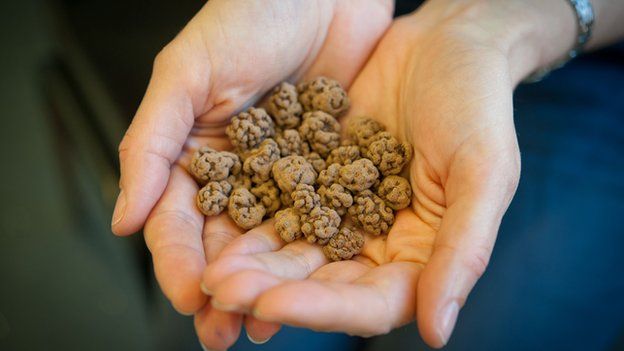Who, what, why: What is 'raw' chocolate?
- Published

"Raw" chocolate is being sold as the latest "superfood", but what is it and why is it getting more popular, asks Justin Parkinson.
Making chocolate is complicated. Cacao beans have to be picked before being fermented, roasted, ground down, pressed, mixed with fat and sugar and turned into bars and other sweets.
Several companies in Europe, the US and Asia have decided to alter one of the processes and no longer roast the beans. They insist that growers in Africa and South America leave them outdoors to dry naturally instead. The resulting product is called "raw" chocolate.
Manufacturers claim that avoiding exposure to oven temperatures allows the preservation of nutrients such as iron, zinc, magnesium, copper and vitamin C, in a similar way to uncooked vegetables. It's also claimed that uncooked cacao contains higher levels of antioxidants than the roasted variety used in most chocolate.
Raw-chocolate makers say their beans never reach temperatures of more than 42C. The friction level of the machine used to grind them is checked to ensure it doesn't make them too hot.
"Over the last 10 years, consumers have become more involved in their food and drink and more discerning," says Kris McGowan, who runs the Raw Chocolate Company. "They care a lot more about its healthy qualities and chocolate is no exception. It's a win-win, as it combines better health benefits with luxuriance."
But Martin Schweizer, professor of biochemistry at Heriot-Watt University, urges caution on describing raw chocolate as a superfood until more research is carried out. "We have to look at this in more depth, including the level of components in each. The research is at a fairly early stage."
Raw chocolate, reportedly the variety eaten by most people in cacao-growing regions, is said to have a more natural taste than that using roasted beans.
There are concerns that not blasting them with heat of up to about 150C could mean an increase in bacteria such as salmonella. However, producers insist that, as no animal products are involved, there is no greater risk than when dealing with vegetables such as carrots or lettuces.
Raw chocolate still accounts for a very small proportion of the UK's sales, worth £2.5bn in the year to last September, although some of the major UK supermarkets have started stocking it.
Jennifer Earle, a writer on chocolate, is unconvinced by it on taste grounds. "You're better off having some ordinary high-cocoa chocolate. It's the quality of the cacao that makes a difference, not whether the chocolate's 'raw' or not," she says. "And if you're talking about health, I'd rather eat some top-quality ordinary chocolate and have a plate of vegetables afterwards instead."
Subscribe to the BBC News Magazine's email newsletter to get articles sent to your inbox.